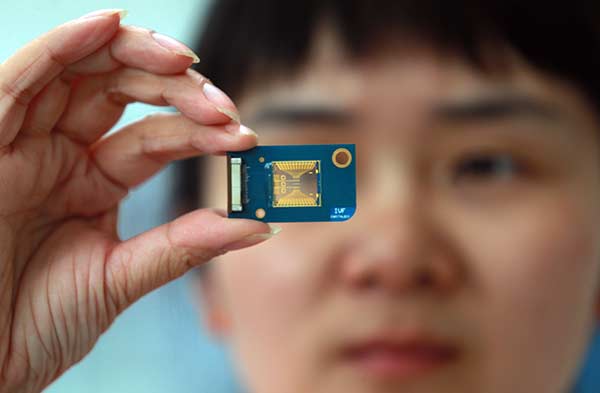
Xie said human eggs release a chemoattractant, a chemical that signals their position to sperm, while the difference in temperature between the cooler sperm reservoir and the warmer fertilization site also prompts the sperm to swim in the right direction.
"Clinical assessment of the two indexes is currently lacking. We constructed two micro-devices with channels shaped like the system inside the female reproductive tract. Sperm are permitted to swim freely without any coercive force, so they can be tested without damaging them," she said.
Motility and chemotaxis are tested on one biochip. Motile sperm will be the first to arrive at the end of a straight "running channel", which is connected by two sub-channels to test the sperms' response to various concentrations of chemoattractant.
Thermotaxic evaluation is undertaken on a second biochip. Temperature-sensitive sperm are attracted to the sub-channel with a high temperature setting, while non-responsive sperm are evenly distributed across the two sub-channels.
In the two tests, about 10 percent of motile sperm were found to be chemotactically responsive, while 5.7 to 10.6 percent showed a thermotactic response.
Experiments have yet to be conducted to establish the number of responsive sperm in both tests.
"But the number might be low, between 5 to 10 percent. The tests can possibly explain some unknown problems with pregnancy, and contribute to sperm selection for IVF," Xie said, adding that work is underway to try and combine all three tests on one biochip.
Implantation screening
Many couples who need IVF technology, such as Li and her husband, say they don't just want a "test-tube" baby, but also a genetically healthy one.
"About 20 percent of infertile patients who want a baby have to turn to IVF. Since the process is more invasive and costly, we need to choose the best-fertilized eggs for implantation," said Qiao Jie, president of Peking University Third Hospital, where more than 5,000 test-tube babies were born last year.
About 10 eggs are fertilized simultaneously in the hospital's lab, according to Qiao. When the fertilized eggs developed into a blastula - a hollow sphere of cells - doctors choose one or more cells for genetic screening, a process known as pre-implantation genetic diagnosis. If a blastula passes screening, it will be placed on a waiting list for implantation.
Under the current procedure, eggs are kept in liquid and can swim freely, which makes it difficult to monitor them every day. However, on the biochip, each egg is positioned undamaged and the channels on the biochip allow the sperm to meet the egg naturally.
"The technology has not been tested on humans. But if it completes the clinical tests successfully, it will make future study of IVF technology far more convenient," Qiao said. "It follows the trend of 'precision medicine' - an approach that allows doctors and researchers to more accurately predict which treatments and prevention strategies for specific illnesses will work in which groups of people."
According to Xie, the next research program will focus on trying to build a biomimetic uterus, which can mimic biochemical processes and, therefore, support the growth of human embryos.
"It may even mean that in the future, a baby may be born without a mother. Human assisted-reproduction technology is moving forward rapidly, and that's expected to bring greater benefits to the next generation," she said.


















































